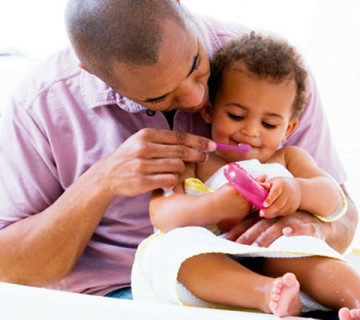Baby’s teeth need as much care as yours
For the average new mother, taking care of a baby’s newly growing teeth is a challenge. As surprising as it could be, many mothers erroneously assume that since a baby’s set of teeth would still fall off at a certain time in the child’s growing process, it may be unnecessary to brush the teeth as regularly as adults do.
This is far from the truth, because dentists advise that once a child starts sprouting teeth, the mother must also wake up to the responsibilities of caring for them.
Professor of Dentistry at the Obafemi Awolowo University, Ile-Ife, Adeyemi Olusile, says this is more so even as the child’s organs are still very tender, and any careless handling of teeth could lead to bacterial infections via the mouth, with dire consequences for everyone involved.
Paediatricians say long before babies are born, little tooth buds develop under the gums; and by the time a baby is between four and six months old, the first tooth starts pushing through the gum lines.
Olusile says the first teeth to appear is usually the two bottom front teeth, known as the central incisors. They are usually followed by the four front upper teeth between four and eight weeks after the first two teeth, and from then on, the teeth growth continues.
Baby formula and teeth
The World Health Organisation advises mothers to breastfeed their babies exclusively for the first six months; but then, for various reasons, babies are also fed infant formula. Paediatricians counsel mothers to be aware that milk bathes baby’s teeth as he feeds through the bottle, and that it’s one of the reasons why they also advise mothers never to let their babies sleep with the feeding bottles in their mouth.
A baby that sleeps with the feeding bottle in the mouth risks developing dental decay, physicians warn.
Olusile explains, “The bacterium that is present in plaque, called strep mutans, is the cause of tooth decay. The bacterium feeds on food sugars to produce the acid that causes decay.”
Physicians say even infants that are breastfed exclusively are not immune to teeth decay because of other factors that impact an infant’s risk for tooth decay. They suggest that once your baby starts growing teeth, you should take time to care for the teeth by brushing for him twice a day – in the morning and before bedtime.
They also suggest giving the baby a sip of water that may help to rinse his teeth as he swallows.
Avoid sticky foods
Nutritionists lament that modern foods are not only too sugary, they are also full of sticky substances that cling to the gums and teeth long after one may have eaten them.
Nutritionist, Dr. Remi Omotunde, says such foods include sweets, cakes, biscuits, chocolates, etc. He warns that tooth decay is directly related to the amount of contact time the teeth have with the sticky foods.
While you may not be able to stop your baby from eating sticky foods, you’d do well to take care of the teeth diligently.
Paediatric dentists suggest that you use soft, moistened washcloth to gently wipe down your baby’s gums at least twice a day, while you could also do the same after eating and before bed time.
Don’t ignore cavities
Experts warn that a child’s teeth are at risk even long before he takes his first bite at sweet. While cavities may result from laxity about brushing the teeth, they say tooth decay, otherwise known as dental caries, is a disease caused by specific germs (mutans streptococcus) that spread easily within families and can last a lifetime.
“The bacteria feed on sugar and produce acid that eats away at the structure of the teeth by depleting calcium. The bacteria infect by creating a yellowish film (plaque) that builds on teeth and contains enamel-eroding acid.
“Once an area without calcium becomes big enough, the surface of the tooth collapses, resulting in what’s called cavity,” dentists say.
Normally, babies are born without any harmful bacteria in the mouth; but experts say they do get infected by age two through so many avenues such as sharing spoons, transfer of saliva through kissing, sharing toothbrushes, etc.
“Once a child’s mouth becomes colonised by mutans, he will be prone to cavities in his baby years; and if the situation is not checked, it can ruin the child’s permanent teeth. That’s why you see adults sporting dirty-looking cavities,” dentists say.
Other causes of tooth issues
Many parents allow their babies to brush their teeth, failing to realise that until a baby is eight years old, he cannot clean his teeth surface effectively as he ought to. You therefore must create time for taking care of your baby’s teeth, or delegating the exercise to a trusted person who can also do it very well.
Dentists also recommend using fluoride toothpaste for your kid. There are many brands in the market; just identify the one your baby can use conveniently and stick to it.
Finally, though seeing the dentist is hardly considered necessary by some people, you don’t have to wait until your child develops teeth problems. Experts recommend taking your child to see the dentist at least once a year, and treating any infection without delay.
PUNCH.








